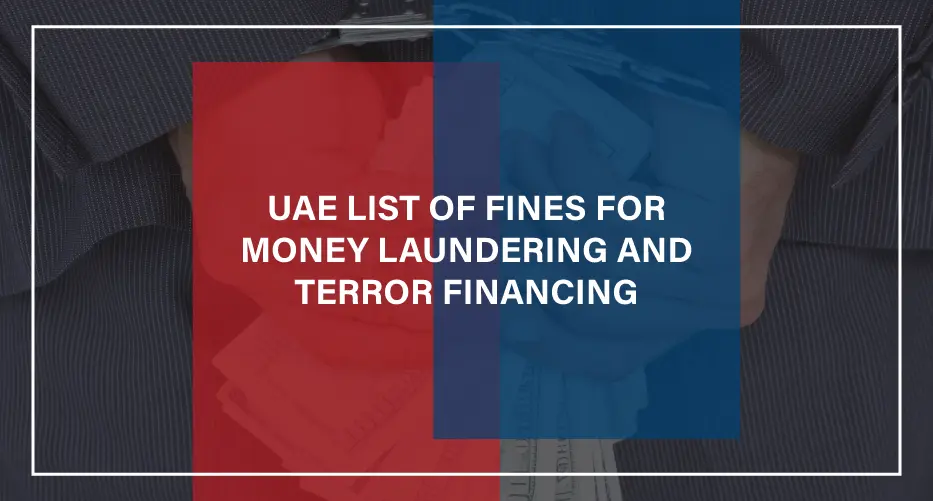UAE List of Fines for Money Laundering and Terror Financing

Introduction
Money laundering and terror financing are serious crimes that pose a significant threat to national and global financial security. In response, the UAE has established a rigorous legal and regulatory framework to detect, prevent, and penalize such activities. These measures are part of the country’s commitment to maintaining transparency and aligning with international anti-money laundering (AML) and counter-terrorism financing (CTF) standards. Authorities have imposed heavy fines, imprisonment, and business sanctions for individuals and entities found guilty of these offenses. This article explores the latest fines, penalties, and enforcement practices related to financial crime and terror financing in the UAE.
Understanding Money Laundering and Terror Financing
Processing illegal funds involves disguising the origins of money obtained through illegal activities to make it appear legitimate. This crime typically unfolds in three key stages. The first stage is placement, where the illicit funds are introduced into the financial system. The second is layering, which involves complex transactions to obscure the source of the money. The final stage is integration, where the laundered money is reintroduced into the economy, making it difficult to trace its illegal origin.
PLACEMENT
Introducing illicit funds into the financial system.
LAYERING
Concealing the source of the money through complex transactions.
INTEGRATION
Integrating the laundered money into the legitimate economy.
Terror financing refers to the act of providing, collecting, or using funds to support terrorist activities, whether directly or indirectly. Unlike money laundering, terror financing may involve funds from both legitimate and illegitimate sources. Individuals or organizations may use personal donations, charitable contributions, business funds, or illicit proceeds to fund terrorism. These transactions are often deliberately concealed through complex financial networks to evade detection, posing a serious threat to global security and economic systems.
UAE’s Legal Framework
The UAE has established a comprehensive legal framework to combat financial crimes, particularly money laundering and terror financing. Through Federal Decree-Law No. 20 of 2018, the country has aligned its regulations with global standards, reinforcing its commitment to financial transparency and security. The law imposes strict money laundering fines and penalties for violations, including hefty monetary penalties, asset confiscation, and imprisonment. Authorities in Dubai and across the UAE actively monitor suspicious transactions to prevent illicit fund flows. Understanding the fines for money laundering and compliance obligations is crucial for individuals and businesses operating under the money laundering UAE regulations.
Federal Law No. 20 of 2018 on Anti-Money Laundering and Combating the Financing of Terrorism

The UAE’s primary legislation on money laundering and terror financing is Federal Law No. 20 of 2018, which provides the legal framework for identifying, preventing, and penalizing these activities. The law mandates that financial institutions and other relevant entities implement stringent measures to detect and report suspicious activities.
Cabinet Decision No. 10 of 2019
This decision outlines the executive regulations of the anti-money laundering law, detailing the obligations of businesses and individuals, the procedures for reporting suspicious transactions, and the penalties for non-compliance.
Fines and Penalties
The UAE imposes significant fines for money laundering and terror financing offenses, reflecting the seriousness of these crimes. The fines are designed to deter such activities and ensure strict compliance with the law.
Failure to Report Suspicious Transactions
- Fine Amount: AED 50,000 to AED 5,000,000
- Description: Financial institutions and other obligated entities must report suspicious transactions to the UAE’s Financial Intelligence Unit (FIU). Failure to do so can result in substantial fines.
Non-Compliance with Customer Due Diligence (CDD) Requirements
- Fine Amount: AED 50,000 to AED 1,000,000
- Description: Entities must conduct thorough due diligence to verify the identity of their customers. Non-compliance with CDD requirements can lead to significant penalties.
Failure to Maintain Records
- Fine Amount: AED 50,000 to AED 500,000
- Description: Entities are required to maintain detailed records of transactions and customer information for a specified period. Failure to maintain these records can result in fines.
Engaging in or Facilitating Money Laundering or Terror Financing
- Fine Amount: AED 100,000 to AED 10,000,000
- Description: Individuals or entities directly involved in money laundering or terror financing activities face severe penalties, including substantial fines and potential imprisonment.
Obstructing Investigations
- Fine Amount: AED 100,000 to AED 500,000
- Description: Obstructing or failing to cooperate with investigations into money laundering or terror financing activities can lead to hefty fines.
Violations by Financial Institutions and DNFBPs (Designated Non-Financial Businesses and Professions)
- Fine Amount: AED 50,000 to AED 5,000,000
- Description: Financial institutions and DNFBPs (such as real estate agents, precious metals dealers, and legal professionals) that fail to comply with anti-money laundering regulations can face significant penalties.
Additional Consequences
Imprisonment
Besides fines, individuals involved in money laundering or terror financing can face imprisonment ranging from 1 to 10 years, depending on the severity of the offense.
Business Sanctions
Companies involved in these activities may face additional sanctions, including suspension of business licenses, restrictions on operations, and other regulatory actions.
Asset Freezing and Seizure
Authorities have the power to freeze and seize assets linked to money laundering or terror financing activities, further disrupting the operations of those involved.
Reputational Damage
Beyond legal penalties, entities and individuals involved in money laundering or terror financing can suffer significant reputational damage, impacting their business operations and relationships.
Reporting Obligations
Financial Institutions
Banks, insurance companies, and other financial institutions in the UAE are legally obligated to establish and maintain comprehensive anti-money laundering (AML) programs. These programs must include thorough customer due diligence (CDD) procedures, continuous monitoring of financial transactions, and regular internal audits to detect and prevent illicit activities. Institutions are also required to provide ongoing staff training and ensure compliance with national and international AML regulations. When any suspicious transactions or activities are identified, they must be promptly reported to the UAE Financial Intelligence Unit (FIU). This proactive approach helps safeguard the UAE’s financial system from abuse by criminal organizations or terrorist networks.
DNFBPs
Designated Non-Financial Businesses and Professions (DNFBPs), such as real estate brokers, jewelers, legal professionals, and accountants, play a crucial role in the UAE’s fight against money laundering and terror financing. These sectors are often targeted for illicit financial activities due to the high-value transactions they handle. As such, DNFBPs are required to implement strict Know Your Customer (KYC) procedures, conduct ongoing due diligence, and report any suspicious transactions to the relevant authorities. Failure to comply with these obligations can lead to significant penalties. The UAE government ensures that DNFBPs remain fully accountable in maintaining financial transparency and combating financial crimes.
Success Stories: UAE’s Efforts in Combating Money Laundering and Terror Financing

Enhanced Monitoring and Reporting Systems:
The UAE has made significant investments in advanced financial monitoring and reporting systems to detect and prevent suspicious transactions. These systems are designed to track unusual patterns in economic activities across banks, money exchange houses, and other financial institutions. By integrating real-time analytics, artificial intelligence, and automated alerts, the UAE can quickly identify potential money laundering and terror financing activities. Additionally, institutions are required to report such transactions to the UAE’s Financial Intelligence Unit (FIU). These enhanced capabilities not only strengthen the country’s financial security but also ensure compliance with international anti-money laundering (AML) and counter-terrorism financing (CTF) standards.
International Cooperation:
The UAE actively cooperates with international bodies, such as the Financial Action Task Force (FATF). It works closely with global partners to enhance the fight against money laundering and terrorist financing. This collaboration includes sharing intelligence, aligning regulatory frameworks, and implementing international best practices to strengthen the country’s financial oversight. The UAE has taken significant steps to meet FATF recommendations by increasing transparency, enhancing financial monitoring systems, and ensuring strict enforcement of anti-money laundering (AML) laws. These efforts not only protect the UAE’s financial ecosystem but also reinforce its reputation as a secure and responsible global business hub.
Public Awareness Campaigns:
The UAE government has taken proactive steps to combat financial crimes by launching comprehensive public awareness campaigns aimed at educating both businesses and the general public about anti-money laundering (AML) laws. These initiatives emphasize the importance of compliance, highlighting how adherence to regulations protects the economy and enhances the country’s global reputation. The campaigns also outline the severe consequences of non-compliance, including hefty fines, license suspension, and even criminal prosecution. Through workshops, media outreach, and government portals, the UAE ensures that all stakeholders understand their responsibilities in detecting, preventing, and reporting suspicious financial activities.
📲 Need help understanding UAE money laundering and terror financing laws?
Message us now on WhatsApp for expert guidance on compliance, legal fines, and how to protect your business.
👉 Click to Chat
Let me know your WhatsApp number or format if you’d like me to insert a clickable link with your actual number.
Conclusion
The UAE’s stringent fines and penalties for money laundering and terror financing underscore the country’s commitment to maintaining a secure and transparent financial system. By understanding and adhering to these regulations, businesses and individuals can contribute to the UAE’s efforts in combating financial crimes. Dahhan Business Services is dedicated to helping businesses navigate these complex regulations, ensuring compliance and promoting a secure business environment in the UAE.





